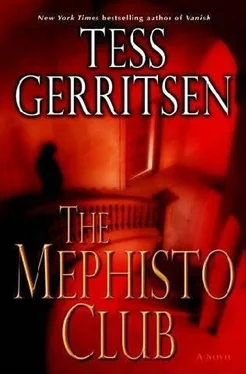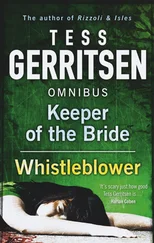“It’s the last thing Dominic told us,” said Lily. “We’re not the only ones.”
“I’m sure there are more.” Sansone looked at Jane. “Whether you realize it or not, Detective, we’re engaged in a war. It’s been going on for centuries, and last night was just one of the battles. The worst is coming.”
Jane gave a shake of the head, a tired laugh. “I see we’re talking about those demons again.”
“I believe in them,” Lily declared, her jaw squared in certainty. “I know they’re real.”
They heard the scrape of the snowplow over pavement, the approaching rumble of a truck engine. At last the road was clear and they could leave this mountain; they could return to their lives. Maura, back to the arms of Daniel Brophy, who could bring her either heartbreak or hope. Jane, back to the job of peacemaker between her battling mother and father.
And I’m going home to Gabriel. He’s waiting for me.
Jane rose and crossed to the window. Outside, sunshine sparkled on perfect snow. The skies were cloudless, and by now the road home would be plowed and sanded. It was a beautiful day to drive home. To hug her husband and kiss her baby. I can’t wait to see you both.
“You still don’t believe me, do you, Detective?” said Sansone. “You don’t believe there’s a war going on.”
Jane looked up at the sky and she smiled. “Today,” she said, “I choose not to.”
Dark clouds hung low, and Lily could smell the tang of impending snow in the air as she stared up at the house where she had grown up. She did not see it as it was today, a derelict shell, the porch sagging, the clapboards weathered to gray. No, she saw it as it once was in summertime, with clematis flowering on the lattice and pots of red geraniums hanging from the eaves. She saw her brother Teddy come out of the house, heard the squeal and the slap of the screen door swinging shut behind him as he ran grinning down the porch steps. She saw her mother in the window, waving, as she called out, “Teddy, don’t be late for dinner!” And she saw her father, sunburned and whistling as he carried his hoe across the yard toward his beloved vegetable plot. She’d been happy here once. Those were the days she wanted to remember, the days she’d hold on to.
Everything else, everything that has happened since, I will consign to the ashes.
“Are you sure about this, Ms. Saul?” said the fire chief.
His crew stood fully garbed in firefighting gear, waiting for the order. Farther down the hill, a small crowd from town had gathered to watch. But it was Anthony Sansone and Gottfried Baum whom she focused on. She trusted them, and now they stood with her, to witness the exorcism of her demons.
She turned back to the house. The furniture had been removed and donated to local charities. Except for the straw bales that the firemen had stacked inside an upstairs bedroom, what stood there now was merely an empty husk.
“Ms. Saul?” said the fire chief.
“Burn it,” she said.
He gave the signal, and his crew moved in with their hoses and their cans of kerosene mixed with diesel fuel. Not often was a house this substantial offered up in sacrifice for a training burn, and the men went at the task with gusto, eager to touch off the fire. For practice, they would douse it, then reset it again and again, until it was time to let the flames triumph.
As black smoke spiraled into the sky, Lily backed away, to stand between the two men whom she had come to regard as mentors, even fathers. Sansone and Baum said nothing, but Lily heard Baum’s sharp intake of breath when the first flames appeared in an upstairs window, and she felt Sansone place a steadying hand on her shoulder. She needed no support; she stood with her back straight, her gaze fixed on the fire. Inside, the flames would be consuming floorboards still stained with the blood of Peter Saul, and licking up walls that had been defiled by unholy crosses. Such places should not be allowed to survive. Such evil can never be cleansed; it can only be destroyed.
Now the firemen retreated from the house to watch the final conflagration. Flames crackled across the roof and melting snow hissed into steam. Orange claws reached through windows and scrabbled up tinder-dry clapboards. Heat drove the firemen backward as the flames fed and grew, like a beast roaring its victory.
Lily gazed into the heart of that fire, now consuming the last remnants of her childhood, and she saw, framed in the glow, a single moment in time. A summer’s evening. Her mother and father and Teddy standing on the porch, watching her scamper about on the grass, waving a net. And fireflies-so many fireflies, like a constellation of stars winking in the night. “Look, your sister’s caught another one!” her mother says, and Teddy laughs, holding up a jar to receive the prize. They smile at her, from across the years, from a place that no flames could ever touch, because it was safe within her own heart.
Now the roof collapsed, and sparks flew into the sky, and Lily heard the gasps of people caught up in the primal thrill of a winter’s fire. As the flames slowly died, the spectators from town began to drift down the hill, back to their cars, the excitement of their day now over. Lily and her two friends remained, watching as the last flames were extinguished and smoke curled from blackened ash. After this rubble was cleared, she would plant trees here. Flowering cherries and crab apples. But there must never be another house on this hill.
Something cold kissed her nose and she looked up to see fat flakes fluttering from the sky. It was a final blessing of snow, sacred and purifying.
“Are you ready to go, Lily?” Baum asked.
“Yes.” She smiled. “I’m ready.” Then she turned to follow them, and the three demon hunters walked together down the hill.
As an anthropology major at Stanford University, I was fascinated by myths from the ancient world. I like to think that there’s a nugget of truth to stories that have been passed down to us through the ages. The mists of time may have altered the details, but even the most improbable tale could well be based on real people and real events.
A few years ago, while browsing a bookstore in Oxford, England, I came across a copy of R. H. Charles’s translation of The Book of Enoch, and could not resist purchasing it. The Book of Enoch is an ancient text, dating back to perhaps two centuries before the birth of Christ. Though it contains the history of an Old Testament patriarch, Enoch, the great-grandfather of Noah, the book was struck from Hebrew scripture and discredited as apocryphal by early Christian fathers. It vanished from history, and for centuries, the text was thought to be forever lost.
But it was not, in fact, lost. Hidden in various secret places, The Book of Enoch had survived. In the 1700s, intact copies of the text, translated from Greek, were discovered in Ethiopia. And in 1947, in a cave on the northwest shore of the Dead Sea, a Bedouin shepherd made a magnificent discovery: jars containing ancient scrolls. From that complex of caves emerged seven fragments of The Book of Enoch, written in Aramaic.
Within the pages of this long-lost text lies a mystery that continues to puzzle scholars. It is the story of The Watchers, fallen angels who had sexual congress with women, producing an unholy race that would forever plague mankind:
Evil spirits have proceeded from their bodies; because they are born from men and from the holy Watchers is their beginning and primal origin; they shall be evil spirits on earth, and evil spirits shall they be called.
These mixed-race creatures, also known as Nephilim, appear in yet another ancient text, The Book of Jubilees. Here, also, they are described as evil and malignant. According to Jubilees, most Nephilim were destroyed during Noah’s time, but God allowed one tenth of their number to survive as subjects of Satan. Through their line, evil would continue to afflict the earth.
Читать дальше












